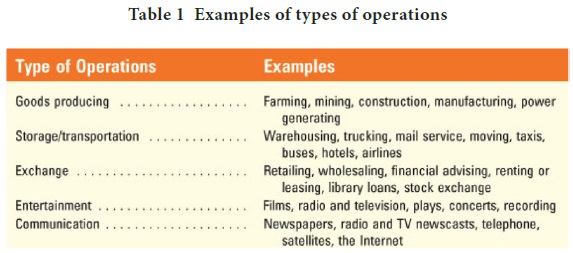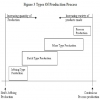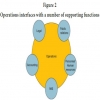Operations Management - Introduction to Operations Management
Roles and Responsibility of an Operations Manager
Posted On :
Some people, particularly, those professionally involved in operations management, argue that operations management involves everything an organisation does.
Roles
and Responsibility of an Operations Manager
Some people, particularly, those professionally involved in operations management, argue that operations management involves everything an organisation does. In this sense, every manager is an operations manager, since all managers are responsible for contributing to the activities required to create and deliver an organization’s goods or services. However, others argue that this definition is too wide, and that the operations function is about producing the right amount of a good or service, at the right time, of the right quality and at the right cost to meet customer requirements.
A stereotypical example of an operations manager would be a plant manager in charge of a factory, such as an automobile assembly plant. But other managers who work in the factory in departments like quality assurance, production and inventory control and line supervisions can also be considered to be working in operations management. In service industries, managers in hotels, restaurants, banks, airline operations,
Operations managers are responsible for managing activities that are part of the production of goods and services. Their direct responsibilities include managing the operations process, embracing design, planning, control, performance improvement, and operations strategy. Their indirect responsibilities include interacting with those managers in other functional areas within the organisation whose roles have an impact on operations. Such areas include marketing, finance, accounting, personnel and engineering.
Operations managers’ responsibilities include:

A primary function of an
operations manager is to guide the system by decision making. Certain decisions
affect the design of the system, and others affect the operation of the system.
System design involves decisions that relate to system capacity, the geographic location of facilities, arrangement of departments and placement of equipment within physical structures, product and service planning, and acquisition of equipment. These decisions usually, but not always, require long-term commitments. Moreover, they are typically strategic decisions.
System operation involves management of personnel, inventory planning and control, scheduling, project management, and quality assurance. These are generally tactical and operational decisions.
Feedback on these decisions involves measurement and control. In many instances, the operations manager is more involved in day-to-day operating decisions than with decisions relating to system design. However, the operations manager has a vital stake in system design because system design essentially determines many of the parameters of system operation. For example, costs, space, capacities, and quality are directly affected by design decisions. Even though the operations manager is not responsible for making all design decisions, he or she can
Purchasing has responsibility for procurement of materials, supplies, and equipment. Close contact with operations is necessary to ensure correct quantities and timing of purchases. The purchasing department is often called on to evaluate vendors for quality, reliability, service, price, and ability to adjust to changing demand. Purchasing is also involved in receiving and inspecting the purchased goods.
Industrial engineering is often concerned with scheduling, performance standards, work methods, quality control, and material handling.
Distribution involves the shipping of goods to warehouses, retail outlets, or final customers.
Maintenance is responsible for general upkeep and repair of equipment, buildings and grounds, heating and air-conditioning; removing toxic wastes; parking; and perhaps security. The operations manager is the key figure in the system: He or she has the ultimate responsibility for the creation of goods or provision of services.
The kinds of jobs that operations managers oversee vary tremendously from organization to organization largely because of the different products or services involved. Thus, managing a banking operation obviously requires a different kind of expertise than managing a steelmaking operation. However, in a very important respect, the jobs are the same: They are both essentially managerial. The same thing can be said for the job of any operations manager regardless of the kinds of goods or services being created.
The importance of operations management, both for organizations and for society, should be fairly obvious: The consumption of goods and services is an integral part of our society. Operations management is responsible for creating those goods and services. Organizations exist primarily to provide services or create goods. Hence, operations management is the core function of an organization. Without this core, there would be no need for any of the other functions—the organization
The service sector and the manufacturing sector are both important to the economy. The service sector now accounts for more than 70 percent of jobs in the country, and it is growing in other countries as well. Moreover, the number of people working in services is increasing, while the number of people working in manufacturing is not. The reason for the decline in manufacturing jobs is two fold:
1. As the operations function in manufacturing companies finds more productive ways of producing goods, the companies are able to maintain or even increase their output using fewer workers.
2. Furthermore, some manufacturing work has been outsourced to more productive companies, many in other countries that are able to produce goods at lower costs.
Some people, particularly, those professionally involved in operations management, argue that operations management involves everything an organisation does. In this sense, every manager is an operations manager, since all managers are responsible for contributing to the activities required to create and deliver an organization’s goods or services. However, others argue that this definition is too wide, and that the operations function is about producing the right amount of a good or service, at the right time, of the right quality and at the right cost to meet customer requirements.
A stereotypical example of an operations manager would be a plant manager in charge of a factory, such as an automobile assembly plant. But other managers who work in the factory in departments like quality assurance, production and inventory control and line supervisions can also be considered to be working in operations management. In service industries, managers in hotels, restaurants, banks, airline operations,
Operations managers are responsible for managing activities that are part of the production of goods and services. Their direct responsibilities include managing the operations process, embracing design, planning, control, performance improvement, and operations strategy. Their indirect responsibilities include interacting with those managers in other functional areas within the organisation whose roles have an impact on operations. Such areas include marketing, finance, accounting, personnel and engineering.
Operations managers’ responsibilities include:
Human resource management – the
people employed by an organisation either work directly
to create a good or service or provide support to those who do. People and the
way they are managed are a key resource of all organisations.
Asset management – an organization’s buildings, facilities, equipment and stock are directly involved in or support the operations function.
Cost management – most of the costs of producing goods or services are directly related to the costs of acquiring resources, transforming them or delivering them to customers. For many organisations in the private sector, driving down costs through efficient operations management gives them a critical competitive edge. For organisations in the not-for-profit sector, the ability to manage costs is no less important.
The chief role of an operations manager is planning and decision making. As an operations manager in an organisation, he exerts considerable influence over the degree to which the goals and objectives of the organization are realized.
Most decisions involve many
possible alternatives that can have quite different impacts on costs or
profits. Consequently, it is important to make informed decisions.
Decision making is a central role of all operations managers. Decisions need to be made in:
1. Designing the operations system
2. Managing the operations system
3. Improving the operations system
Operations management professionals make a number of key decisions that affect the entire organization. These include the following:
1. The processes by which goods and services are produced
2. The quality of goods or services
3. The quantity of goods or services (the capacity of operations)
4. The stock of materials (inventory) needed to produce goods or services
5. The management of human resources
You can put them under the following questions
What: What resources will be needed, and in what amounts?
When: When will each resource be needed? When should the work be scheduled? When should materials and other supplies be ordered? When is corrective action needed?
Where: Where will the work be done?
How: How will the product or service be designed? How will the work be done (organization, methods, equipment)?
How will resources be allocated?
Who: Who will do the work?
The operations function consists of all activities directly related to producing goods or providing services. Hence, it exists both in manufacturing and assembly operations, which are goods-oriented, and
The following table provides examples of the diversity of operations management settings.
Asset management – an organization’s buildings, facilities, equipment and stock are directly involved in or support the operations function.
Cost management – most of the costs of producing goods or services are directly related to the costs of acquiring resources, transforming them or delivering them to customers. For many organisations in the private sector, driving down costs through efficient operations management gives them a critical competitive edge. For organisations in the not-for-profit sector, the ability to manage costs is no less important.
The chief role of an operations manager is planning and decision making. As an operations manager in an organisation, he exerts considerable influence over the degree to which the goals and objectives of the organization are realized.
Decision making is a central role of all operations managers. Decisions need to be made in:
1. Designing the operations system
2. Managing the operations system
3. Improving the operations system
Operations management professionals make a number of key decisions that affect the entire organization. These include the following:
1. The processes by which goods and services are produced
2. The quality of goods or services
3. The quantity of goods or services (the capacity of operations)
4. The stock of materials (inventory) needed to produce goods or services
5. The management of human resources
You can put them under the following questions
What: What resources will be needed, and in what amounts?
When: When will each resource be needed? When should the work be scheduled? When should materials and other supplies be ordered? When is corrective action needed?
Where: Where will the work be done?
How: How will the product or service be designed? How will the work be done (organization, methods, equipment)?
How will resources be allocated?
Who: Who will do the work?
The operations function consists of all activities directly related to producing goods or providing services. Hence, it exists both in manufacturing and assembly operations, which are goods-oriented, and
The following table provides examples of the diversity of operations management settings.

System design involves decisions that relate to system capacity, the geographic location of facilities, arrangement of departments and placement of equipment within physical structures, product and service planning, and acquisition of equipment. These decisions usually, but not always, require long-term commitments. Moreover, they are typically strategic decisions.
System operation involves management of personnel, inventory planning and control, scheduling, project management, and quality assurance. These are generally tactical and operational decisions.
Feedback on these decisions involves measurement and control. In many instances, the operations manager is more involved in day-to-day operating decisions than with decisions relating to system design. However, the operations manager has a vital stake in system design because system design essentially determines many of the parameters of system operation. For example, costs, space, capacities, and quality are directly affected by design decisions. Even though the operations manager is not responsible for making all design decisions, he or she can
Purchasing has responsibility for procurement of materials, supplies, and equipment. Close contact with operations is necessary to ensure correct quantities and timing of purchases. The purchasing department is often called on to evaluate vendors for quality, reliability, service, price, and ability to adjust to changing demand. Purchasing is also involved in receiving and inspecting the purchased goods.
Industrial engineering is often concerned with scheduling, performance standards, work methods, quality control, and material handling.
Distribution involves the shipping of goods to warehouses, retail outlets, or final customers.
Maintenance is responsible for general upkeep and repair of equipment, buildings and grounds, heating and air-conditioning; removing toxic wastes; parking; and perhaps security. The operations manager is the key figure in the system: He or she has the ultimate responsibility for the creation of goods or provision of services.
The kinds of jobs that operations managers oversee vary tremendously from organization to organization largely because of the different products or services involved. Thus, managing a banking operation obviously requires a different kind of expertise than managing a steelmaking operation. However, in a very important respect, the jobs are the same: They are both essentially managerial. The same thing can be said for the job of any operations manager regardless of the kinds of goods or services being created.
The importance of operations management, both for organizations and for society, should be fairly obvious: The consumption of goods and services is an integral part of our society. Operations management is responsible for creating those goods and services. Organizations exist primarily to provide services or create goods. Hence, operations management is the core function of an organization. Without this core, there would be no need for any of the other functions—the organization
The service sector and the manufacturing sector are both important to the economy. The service sector now accounts for more than 70 percent of jobs in the country, and it is growing in other countries as well. Moreover, the number of people working in services is increasing, while the number of people working in manufacturing is not. The reason for the decline in manufacturing jobs is two fold:
1. As the operations function in manufacturing companies finds more productive ways of producing goods, the companies are able to maintain or even increase their output using fewer workers.
2. Furthermore, some manufacturing work has been outsourced to more productive companies, many in other countries that are able to produce goods at lower costs.
Tags : Operations Management - Introduction to Operations Management
Last 30 days 2642 views














